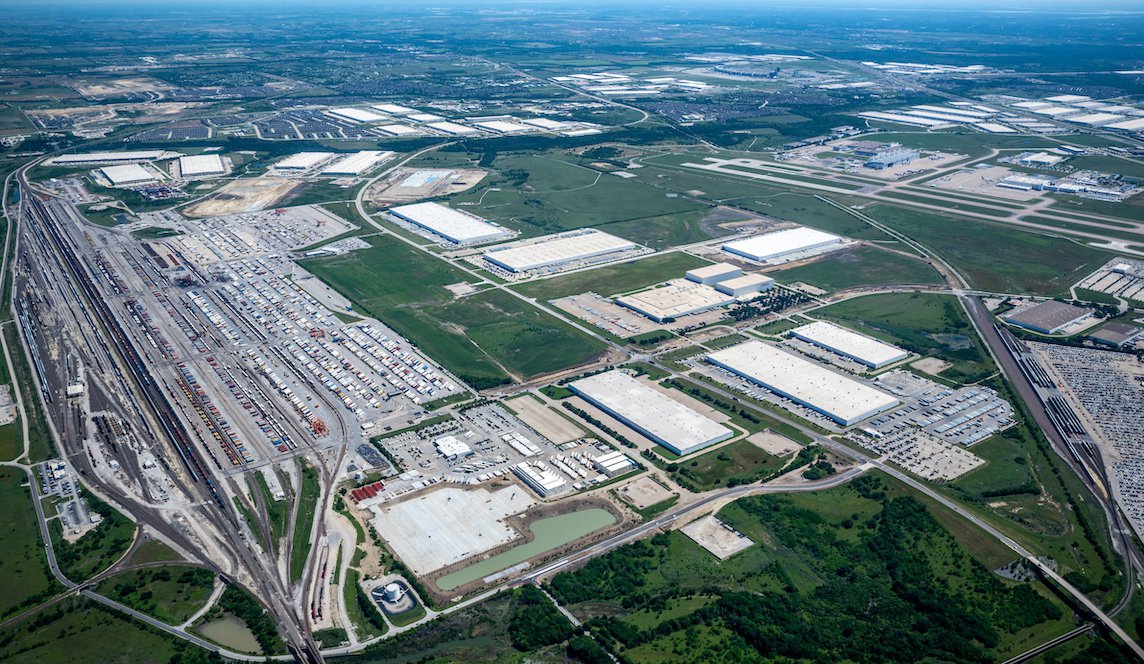Hillwood, BNSF Railway and the city of Fort Worth have formalized the creation of the Alliance Logistics District, a first-of-its-kind mobility logistics hub approved by the Fort Worth City Council earlier this month.
Effective immediately, the district will operate within the Smart Port at AllianceTexas, Hillwood’s 27,000-acre master-planned development in north Fort Worth, and is designed to redefine how freight moves through North Texas while reducing the burden on public roadways.
Anchored by North America’s largest inland rail port — BNSF’s Alliance intermodal facility — the Alliance Logistics District is the first district of its type within the BNSF rail and intermodal network.
Hillwood’s request to the City Council emphasized the alignment of the Alliance Logistics District with the city’s 2023 Innovation Districts Policy, which aims to foster hubs of research, technology development and entrepreneurship.
According to Hillwood, the district exceeds the city’s criteria by supporting sectors including logistics, automation and advanced manufacturing, all anchored by Perot Field Fort Worth Alliance Airport and BNSF’s intermodal operations.
The district is intended to strengthen Fort Worth’s reputation as a global center for logistics and technology through innovation-driven employment, smart infrastructure, and public-private collaboration.
“By integrating advanced technology, modern infrastructure and regulatory flexibility, this initiative reinforces AllianceTexas’ standing as one of the most connected, forward-thinking logistics ecosystems in the country,” said Nicholas Konen, vice president of strategic development at Hillwood, in a statement. “These advancements reduce costs for customers, improve logistics efficiency and take pressure off public roadways.”
The nearly 1,400-acre district is purpose-built for advanced industrial operations. It offers direct BNSF rail access and flexible infrastructure for manufacturers and shippers handling dense, heavy or high-value goods such as ceramics, plastics and auto parts — product categories where speed and transportation efficiency are essential.
The initiative provides a set of operational and regulatory advantages intended to improve efficiency and reduce costs for any operator or customer functioning within its boundaries. Among the most significant benefits are the ability to deploy semi- and fully autonomous vehicles along district roadways, the use of private hostler vehicles without a commercial driver’s license to shuttle freight between the intermodal yard and District warehouses, and the right to conduct heavy-haul freight movements exceeding 80,000 pounds without securing special-use permits.
These capabilities are designed to cut operating costs, enhance connectivity and support the next generation of automated and high-capacity freight movement. The district’s location next to one of BNSF’s largest intermodal facilities further positions customers to realize substantial efficiencies through improved multimodal integration, including autonomous and semi-autonomous shuttle operations and overweight freight movement.
“Through this public-private partnership, Fort Worth continues to lead in smart, sustainable infrastructure that drives our region’s economic vitality,” said Lauren Prieur, Fort Worth’s director of transportation and public works.
The inland port at AllianceTexas serves as the primary port of entry for the southwestern United States, linking global trade to the region through intermodal connections with ports including Los Angeles, Long Beach and Houston. A recent study by the Texas Comptroller’s office reported that Texas ports generated $1 trillion in international trade in 2024, with AllianceTexas contributing $834.6 million — a 550.7% increase since 2016.
“The Alliance Logistics District aligns perfectly with BNSF’s vision to deliver transportation services that consistently meet our customers’ expectations, with these innovations delivering cost savings and additional supply chain value,” said Jon Gabriel, BNSF group vice president of consumer products.
Hillwood is also advancing a $20 million private heavy-haul bridge over FM 156 to connect the district directly to BNSF’s intermodal facility. Planned to TxDOT standards and engineered for 120,000-pound axle loads, the three-lane structure will support heavy-haul freight movement and reduce truck congestion on public roadways. Construction is expected to be completed by late 2026.
